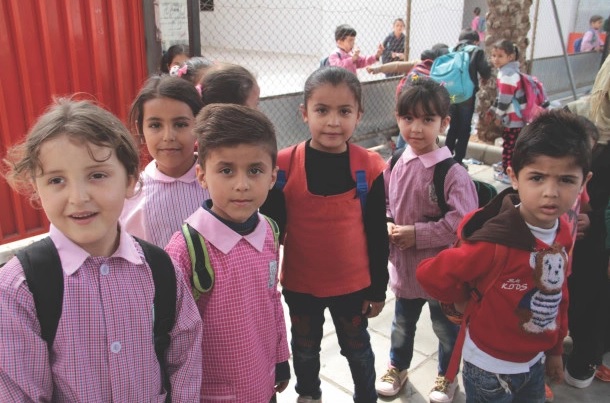العودة

UNESCO: 250 million children now out of school
اليونسكو
2023 - 11 - 01
New figures released by the UN Education, Science, and Cultural Organization (UNESCO) in mid-September, reveal an increase in the number of children not receiving any formal education, reaching a total of 250 million.

New figures released by the UN Education, Science, and Cultural Organization (UNESCO) in mid-September, reveal an increase in the number of children not receiving any formal education, reaching a total of 250 million.
This concerning trend not only jeopardizes the United Nations' education objectives but also places the educational futures of millions of children in peril. The Director-General of UNESCO is calling on States to take rapid action: “The future of millions of children is in your hands.”
These findings also pose a direct challenge to UN Sustainable Development Goal 4 (SDG 4), which aims to provide quality education for all by 2030. According to UNESCO's analysis, had countries been making progress in alignment with their national SDG 4 targets, an additional six million children of primary school age would currently be enrolled in pre-school programmes, 58 million more children, adolescents, and youth would have access to formal education, and no less than 1.7 million additional primary school teachers would have received essential training.
Commitments made must be honored
One year ago, a milestone was reached as 141 countries pledged their commitment at the UN Transforming Education Summit (TES) to overhaul their education systems, accelerating progress towards the attainment of SDG 4. Among these nations, 4 out of 5 countries expressed their intent to enhance teacher training and professional development, while 7 out of 10 vowed to increase or enhance their investments in education. Additionally, 1 in 4 nations made a commitment to increase financial support and expand school meal programmes.
However, as UNESCO's Director-General, Ms Audrey Azoulay emphasized, “These commitments must now be reflected in acts. There is no more time to lose. To achieve SDG 4, a new child needs to be enrolled in school every 2 seconds between now and 2030.” To meet their respective targets, countries must strive to enroll 1.4 million children in early childhood education annually until 2030, and the progress in primary school completion rates must nearly triple to ensure the realization of these critical educational objectives.
Progress made since 2015 is too slow
Since 2015, the percentage of children completing primary education has increased by less than 3 percentage points to 87%, and the percentage of youth completing secondary education has increased by less than 5 percentage points to 58%, as showcased in the 2023 UNESCO Global Education Monitoring (GEM) Report.
In the 31 low- and lower-middle-income countries that monitor learning outcomes at the end of primary schooling, it's noteworthy that Vietnam stands out as the sole nation where the majority of children are attaining minimum proficiency levels in both reading and mathematics. On a global scale, youth literacy rates have seen a negligible improvement, rising by less than 1 percentage point. Conversely, there has been a noteworthy decline of 10% in the rates of adult engagement in education, encompassing both formal and non-formal education, with this decline primarily attributed to the disruptions caused by the COVID-19 pandemic.
Notes
The Education 2030 Framework for Action called on countries to establish intermediate benchmarks for SDG 4 indicators. Embracing an inclusive approach, countries were provided with support in setting these benchmarks to be reached by 2025 and 2030, which were identified across seven crucial areas within SDG 4, encompassing pre-primary education, school attendance, completion rates, learning outcomes, teacher training, gender equity, and public expenditure in education.
For more information:
https://www.unesco.org/en/articles/unesco-global-number-out-school-children-rises-6-million?hub=701
https://news.un.org/en/story/2023/09/1140882
أحدث المنشورات
القائمة الكاملةاليونسكو
المستقبل على المحك: لماذا الاستثمار في التعليم أمر بالغ الأهمية؟
يسلط هذا التقرير، الذي أعدّته اللجنة التوجيهية الرفيعة المستوى المعنية بالهدف الرابع من أهداف التنمية المستدامة (SDG4) بالتعاون مع الشراكة العالمية من أجل التعليم (GPE) ونُشر في عام 2024، الضوء على الحاجة المُلِحّة لتعزيز الاستثمار في التعليم كوسيلة أساسية لمواجهة التحديات العالمية، بما في ذلك تغيّر المناخ، والتطورات التكنولوجية، والتحوّلات الديموغرافية.
اليونسكو
المدن العربية تتألق في جوائز مدن التعلم لليونسكو لعام 2024
تُحرز المدن العربية تقدمًا كبيرًا في مجال التنمية المستدامة والتعلم مدى الحياة، مع تركيز متزايد على إنشاء بيئات تعليمية شاملة تُسهم في تحقيق الأهداف التنموية المحلية والعالمية. وقد احتفلت جوائز مدن التعلم لعام 2024، التي تُمنح من قِبَل اليونسكو، بهذه الجهود، مبرزةً المدن العربية التي تميزت في بناء مجتمعات تعليمية.
اليونسكو
مؤتمر اليونسكو العالمي الثالث للموارد التعليمية المفتوحة: تعزيز الوصول الشامل إلى المعرفة
انطلق مؤتمر اليونسكو العالمي الثالث للموارد التعليمية المفتوحة (OER) في 19 نوفمبر/تشرين الثاني 2024، في مركز دبي التجاري العالمي في دولة الإمارات العربية المتحدة، ليكون المرة الأولى التي يُستضاف فيها هذا الحدث في العالم العربي. نظّم مؤتمر اليونسكو بالتعاون مع مؤسسة محمد بن راشد آل مكتوم للمعرفة (MBRF)واستقطب أكثر من 500 مشارك ومشاركة من نخبة القادة العالميين، وصنّاع السياسات، وممثلي المؤسسات التعليمية، بما في ذلك وزراء، وأكاديميون، وخبراء من القطاع الخاص. وتركّزت المناقشات على مدار يومين حول تعزيز الاستفادة من الموارد التعليمية المفتوحة والتقنيات الناشئة، بهدف تحقيق وصول عادل وشامل إلى التعليم، وتقليص الفجوة الرقمية على الصعيد العالمي.
اليونسكو
الأمم المتحدة تحتفي في شهر ديسمبر/كانون الأول بحقوق الإنسان، والأشخاص ذوي الإعاقة، واللغة العربية
تُحيي الأمم المتحدة في شهر ديسمبر/كانون الأول ثلاث مناسبات بارزة تُعنى بحقوق الإنسان، وبحقوق الأشخاص ذوي الإعاقة، وباللغة العربيّة، ممّا يجعل هذا الشهر فرصةً عالميّةً للتفكير والعمل. وتقود اليونسكو الجهود لتعزيز التعليم الشامل، وحماية حقوق الإنسان، والاحتفاء بالإرث الثقافيّ واللغويّ للّغة العربيّة، من خلال سلسلة من الفعاليات والمبادرات.